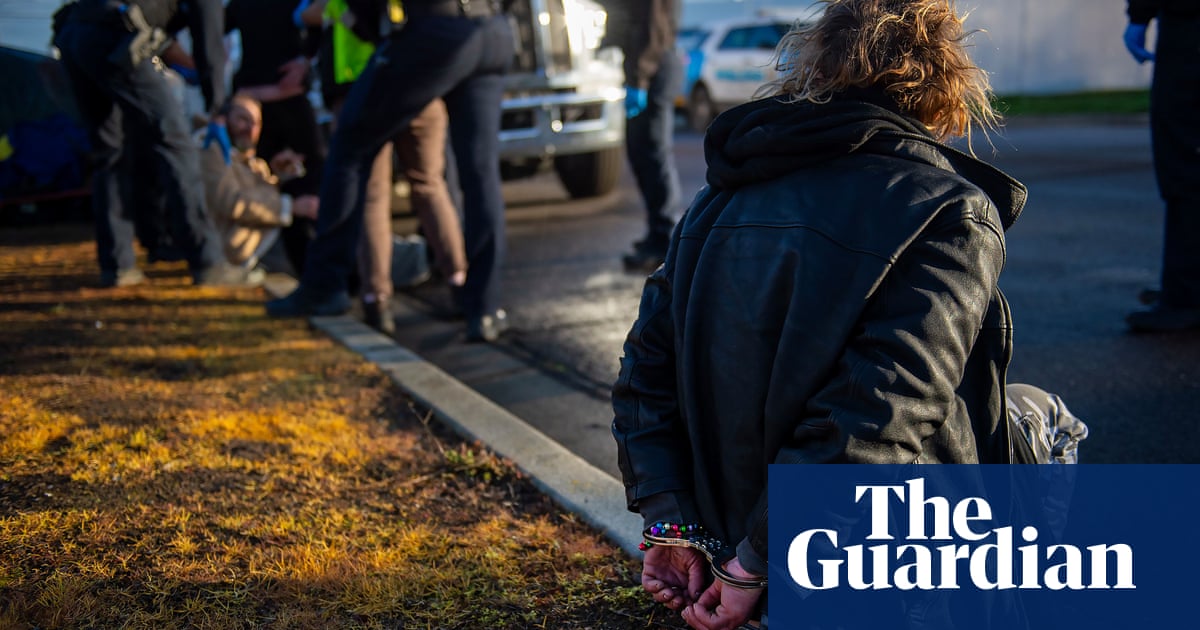In September, Oregon lawmakers enacted legislation turning low-level drug possession into a more serious crime punishable by up to 180 days in jail. The resulting crackdown has led to thousands of arrests statewide in recent months. People targeted in cities such as Medford, and overworked public defenders tasked with representing them, say the drug enforcement has been chaotic and at times brutal.
While the new policy has appeared to reduce visible drug use in some public spaces, unhoused people, who have been most impacted by the police response, say it has exacerbated their struggles.
…
The Medford police department has led the state in drug criminalization – by a lot.
The city is located in a region near the California border that is one of the more conservative areas of a blue state; more than half of voters in Jackson county, which includes Medford, supported Donald Trump.
From September, when the new law was enacted, through 26 March, the Medford police force carried out 902 drug possession arrests – more than double the number of cases in Portland (a city with seven times the population). Jackson county has logged 1,170 arrests total.
Verling, an officer on the city’s “livability” team, a unit focused on low-level crimes, including unlawful camping, trespassing, public drinking and drug possession, said many police were relieved when drugs were recriminalized. The 2020 reform had led to increasing reports of drug use on the streets and growing concern about public intoxication.
Recriminalization, Verling said, allows him to engage people in hopes of pushing them to treatment. “I really don’t want to see someone go to prison … but this gives us the ability to get back into their lives,” he said on a recent patrol through Medford.
He said the job was most rewarding when seeing someone turn their life around after they’ve been jailed – and when his team arrests dealers, potentially “making people sober by making the drugs inaccessible”.
One of the livability team’s main priorities has been clearing homeless encampments, and as Verling drove his patrol car onto a pedestrian greenway, the impact was clear. During the pandemic, encampments were a common site. Now, there were few visible signs of homelessness. Several locals were jogging.
Where did people go?
“People leave town. They’re like, ‘OK well it’s a crime to camp here,’” he said, adding he believed many were in shelters.
…
Jackson county designed its program so officers could directly hand over arrestees to drug treatment programs instead of jail, a collaborative approach meant to get people immediate help without involving the courts. But many don’t qualify, aren’t offered this alternative during their arrest, or they decline an officer’s offer. According to the latest available data, while there have been nearly 1,200 possession arrests, as of 27 March, only 69 people have been referred to deflection.
Instead, many get arrested. And rearrested. One 43-year-old unhoused woman said police were “acting like every person on the street is a drug addict, which is not true”, and that she had been arrested four times by Medford’s livability team since October, generally for camping violations. While she was quickly released after her last arrest, her partner was not, leaving her to camp outside alone. The woman, who asked not to use her name out of fear of police retaliation, said she was sleeping in front of a social services center in hopes her partner could easily find her when he gets out. “The separation makes me feel like I can’t breathe,” she added. “Police say they’re helping the homeless, but they’re just throwing us in handcuffs and jail.”



The solution is social welfare programs and a focus on mental health, job placement, and relocation assistance. Give the vast majority of people health care, stable employment, and a safe place to live, and they will thrive.
The solution is not cramming people into prison labor and ripping their constitutional rights from them.
I really don’t understand how this isn’t obvious to everyone.
That’s not the solution, because given a choice, addicts will not choose it.
The real solution is involuntary commitment for mental health and drug treatment, but nobody wants to go there.
Again with the simple answer. No evidence, no supporting argument, just “nuh uh”.
What more evidence do you want? It’s already up thread from here. Read the links I already posted.
16,000 people given $100 tickets under Measure 110. They could make the ticket go away if they just called a toll free number with information on support. They didn’t have to actually get help, the ask was “call this toll free number”. Less than 1% did.
Compared with now when the choice is “get help or go to jail”, it’s up to 7% getting help, better, but it still means 93% choose jail over getting clean.